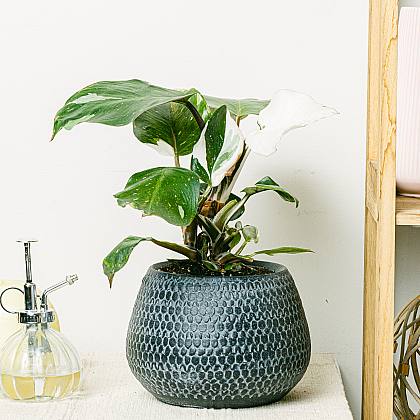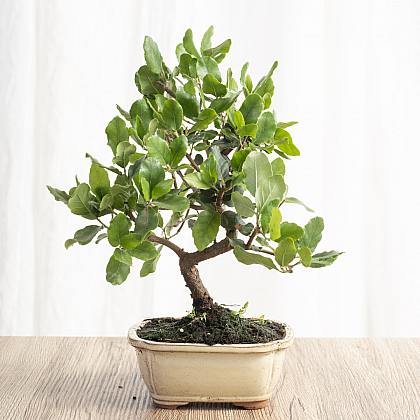Kitchen plants: tips for choosing the right one
Kitchen plants are a wonderful addition to any home, not only because of their beauty and aroma, but also because of the benefits they bring to our meals and...
Kitchen plants are a wonderful addition to any home, not only because of their beauty and aroma, but also because of the benefits they bring to our meals and health. In this article, we will explore the different aspects related to kitchen plants, from the benefits they have in our diet to the care they require. We will discover how to choose the right varieties for our kitchen and how to keep them healthy over time. If you're interested in growing your own herbs and seasonings at home, read on for helpful tips and to find out everything you need to know about kitchen plants.
Benefits of Having Kitchen Plants at Home
Having kitchen plants at home is not only a way to decorate and beautify our space, but it also provides us with a number of both culinary and health benefits. First of all, having kitchen plants allows us to have access to fresh and tasty ingredients at any time. We can cut a few basil leaves to add to our pasta, or take a few sprigs of rosemary to season our dishes. Aromatic plants are a real explosion of flavors that can transform our recipes and make them more delicious. In addition, these plants also have medicinal properties and can help us improve our health. For example, peppermint can relieve indigestion, ginger can fight nausea, and cilantro can help detoxify our bodies. Another advantage of having kitchen plants is that many varieties are easy to care for, making them ideal for those who have no previous gardening experience. Even if we have a small space, there are kitchen plants that are perfectly suited to small pots or can even be grown indoors. In short, having kitchen plants at home provides us with fresh and tasty ingredients, benefits for our health, and a simple way to add a special touch to our daily recipes.
Aromatic plants: an explosion of flavours
Aromatic plants are an excellent choice for those who want to add a special touch to their dishes. These plants are very versatile and can be used in a wide variety of recipes, from salads to meats. Some of the most popular aromatic plants are basil, rosemary, oregano, and thyme. Each of these plants has a unique flavor that can enhance the flavor of food. For example, basil is great for adding to pastas and pizzas, while rosemary is perfect for red meat and oregano for salads. In addition to their taste, these plants also have health-promoting properties. Basil, for example, contains antioxidants that help prevent cardiovascular disease, and rosemary has anti-inflammatory properties. Aromatic plants are easy to grow at home and can be kept in pots in the kitchen or in a small garden. It's important to note that these plants need specific care, such as proper watering and adequate exposure to sunlight. In short, aromatic plants are an excellent choice for those looking to spice up their dishes while enjoying the health benefits they offer.
Medicinal Plants: More Than Condiments
Medicinal plants are more than condiments in the kitchen, as they offer a wide range of benefits for our health. These plants contain natural compounds that can help alleviate different ailments and improve our well-being. For example, peppermint is known for its ability to relieve digestive issues such as indigestion and stomach cramps. In addition, rosemary has antioxidant and anti-inflammatory properties, making it an excellent ally for strengthening the immune system. Another popular medicinal plant is aloe vera, which is used to treat burns and wounds due to its healing and soothing properties. In addition to these plants, there are also others such as lavender, chamomile, and ginger, which have relaxing, sedative, and digestive properties respectively. It is important to keep in mind that although these plants can be used as condiments in our meals, we can also take advantage of their benefits by preparing infusions or essential oils. However, it is essential to consult with a healthcare professional before using any medicinal plant, as some may have contraindications or drug interactions. In short, medicinal plants are an excellent option to add flavor to our meals and improve our health naturally.
Easy-to-care kitchen plants
Easy-to-care kitchen plants
If you're new to the world of kitchen plants and don't have much experience caring for them, don't worry. There are varieties that are very easy to maintain and are perfect for beginners. One of them is chives, an herbaceous plant characterized by its slender stems and green tubular leaves. Chives are hardy and can grow in pots or directly in the ground. In addition, it requires little care and only needs moderate watering and indirect sunlight.
Another easy-to-care plant is basil. This aromatic plant is very popular in the kitchen due to its intense flavor and aroma. Basil needs well-drained soil and regular waterings, but not excess. In addition, it adapts well to different light conditions, although it prefers direct sunlight.
Finally, rosemary is another kitchen plant that requires little care. This perennial herb is known for its signature aroma and flavor, and can grow both in pots and in the garden. Rosemary needs dry, sunny soil, so you should avoid overwatering.
These are just a few of the easy-to-care kitchen plants you can keep at home. Remember that each plant has its own needs, so it's important to do your research on them before purchasing them. With a little attention and care, you'll be able to enjoy fresh and flavorful ingredients right from your own kitchen.
Kitchen plants for small spaces
If you live in an apartment or a house with little outdoor space, don't worry, you can also enjoy the benefits of having kitchen plants. There are varieties that adapt perfectly to small spaces such as thyme, rosemary, basil, coriander and mint. These plants can grow in small pots and can be placed in your kitchen window or in a sunny corner of your home. In addition, there are also hanging pots that allow you to take advantage of the vertical space to grow your favorite kitchen plants. Another option is to create a vertical garden with stackable modules where you can grow different varieties of aromatic and medicinal plants. Remember that it's important to select the right pots for each plant and make sure they have good drainage to prevent water from accumulating in the roots and rotting. You should also pay attention to the amount of sunlight your plants receive and water them regularly according to their specific needs. Growing your own kitchen plants in tight spaces not only saves you money on buying fresh herbs, but also allows you to enjoy the pleasure of cooking with fresh, healthy ingredients.
How to select the best varieties for your kitchen
When selecting the best plant varieties for your kitchen, it's important to consider a few key factors. First, you need to consider the weather and light conditions in your home. Some plants require a lot of direct sunlight, while others can grow well in shadier locations. Be sure to choose plants that suit your kitchen conditions.
Another aspect to consider is the available space. If you have a small kitchen, you may want to opt for compact plants or varieties that can be grown in hanging pots. This way, you'll be able to make the most of the limited space.
It's also important to consider your culinary needs. If you are a lover of aromatic herbs, you can opt for varieties such as rosemary, thyme or basil. Not only will these plants add flavor to your dishes, but they will also add a decorative touch to your kitchen.
Finally, don't forget to consider your level of experience and skills as a gardener. If you're a beginner, it may be more convenient to opt for plants that are easy to care for and don't require too much special care.
When selecting the best varieties for your kitchen, be sure to take all of these factors into account to ensure your plants grow healthy and provide you with the benefits you're looking for. Remember that having plants in the kitchen is not only aesthetically pleasing, but it can also enhance your dining experience by having fresh ingredients at your fingertips.
Tips for Keeping Your Kitchen Plants Healthy
Keeping your kitchen plants healthy is essential to enjoy their benefits for a long time. To do this, it's important to pay attention to the amount of water they receive, as well as the quality of the soil and sunlight they need. As for watering, it's best to do it in moderation, as overwatering can rot the roots and kill the plant. On the other hand, the soil needs to be well-drained and rich in nutrients for the plants to grow healthy and strong. If you have doubts about the type of soil your plants need, you can go to a specialized store or ask a gardening expert. In addition, it is important that the plants receive enough sunlight, but without directly exposing them to the strongest sun rays of the day, as this can burn the leaves. If your kitchen doesn't have enough natural light, you can choose to place plants near a window or use special plant lamps. Finally, you should be aware of potential pests or diseases that may affect your plants and act quickly to prevent their spread. With these simple yet effective tips, you'll be able to keep your kitchen plants healthy and enjoy their culinary benefits for a long time.
Kitchen plants are an excellent addition to any home, not only for their decorative value, but also for their culinary and medicinal benefits. With the right tips, anyone can select the best varieties for their space and keep them healthy for a long time. From aromatic to medicinal plants, each variety has something special to offer. In addition, taking care of them can be a relaxing and rewarding activity. However, it is important to remember that not all plants are suitable for human consumption and that some can be toxic. Therefore, you should always do your research well before buying any kitchen plants. What other plants do you think could be useful in the kitchen? Have you had any interesting experiences with kitchen plants? Reflect on this and share your thoughts with other gardening and foodies


